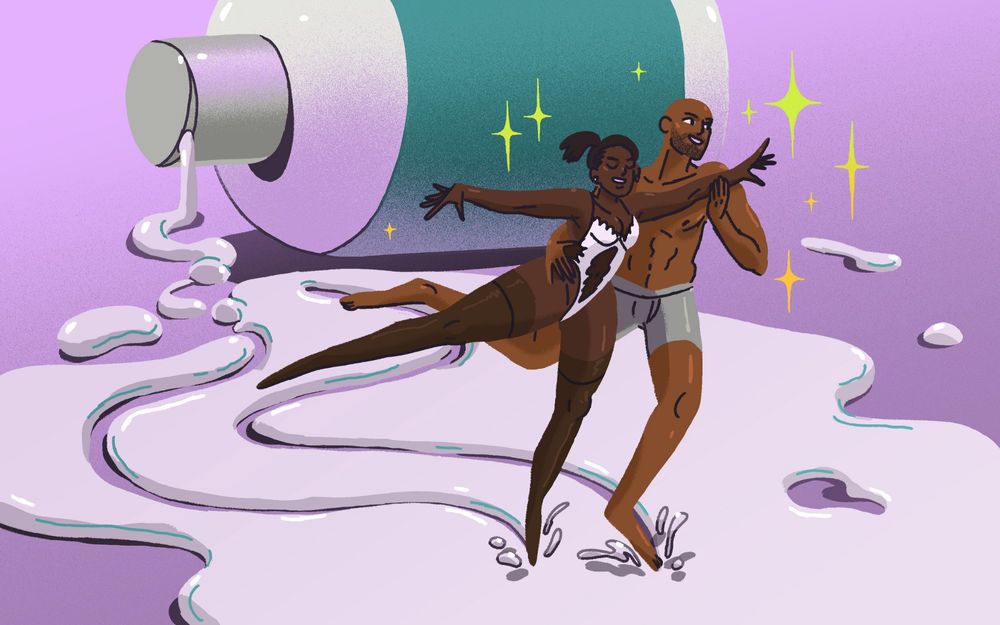So. Let’s slide right into this week’s discussion. (See what I did there?)
Do you think you need to use an external lubrication in your sexual relationship? In a very anecdotal study I conducted on social media — just for you, dear reader — many women reported that some type of extra moisture made sex more enjoyable. But the majority of their partners — that’s you, dear reader — don’t use it regularly, or even at all.
The thing is, the ROI is so high that using lubrication during sex is like being a good kisser: As long as you’re doing it the right way, you can only gain good lover points. As always, you’ve gotta communicate with your partner. If you don’t feel comfortable bringing up lube, there’s a good chance she doesn’t either.
Lube is a complicated topic. Especially for men’s egos. There’s a common perception that a woman’s sexual organs lubricate in relation to her arousal, hence loverman braggadocio like “I’m the one who put the satin on ya panties.” But it’s very rarely that simple. A woman can be fully geared up and ready for action — but depending on her age, her stress levels, or simply her biochemistry, the situation isn’t so much “Splash Waterfalls” as it is “Sing About Me, I’m Dying of Thirst.” And it all comes down to two little half-centimeter glands that have a very large job to do.
First, a history lesson. About 300 years ago, an anatomist by the name of Caspar Bartholin began to study female sexual organs. (I know, I know, hold the jokes.) He found that the vagina was naturally moist because of those two tiny pea-shaped ducts on either side that secrete extra moisture during sexual arousal. These are now known as Bartholin’s glands — leave it to a man to try to leave his name on it — and while they’re helpful, they often need a little more help.
If your woman has any number of mild conditions, from premenopause to anxiety, it could impede Bartholin’s helpful (but tiny) little glands from doing quite enough. And without the right level of lubrication, sex becomes a much less pleasurable proposition. At best, it’s a chore; at worst, it’s actually painful and not enjoyable at all.
But here’s the thing: There’s really no such thing as too wet. Extra lubrication is great no matter what — even for women whose Bartholin’s glands are the first ones in the gym and the last ones to go home. So. Ready to shop? Let’s go.
There are essentially four different bases for commercial lubricant: water, silicone, oil, or a combination of the above. Water-based is the best place to start. It’s good for folks who may be sensitive to other compounds, and it works well with toys. It’s also safe to use with condoms — both latex or non-latex — and can actually help make sure condoms don’t break. Sexy and safe!
The one thing about water-based lube is that you might need to reapply throughout a session. If you want a few drops to go a long way, you’re gonna need silicone. It’s got longer-lasting slippage and you can bounce around to any and all positions without needing to go back to the well. (Beware potions that come with scents, though — the chemicals involved could irritate both of you!)
Oil-based lubricant can also be used for some pre-action massage, but it’s probably your last choice as a lube. Not only can it stain sheets and clothing, but it can break down latex condoms — and it’s even been linked to an increased risk for yeast or bacterial infections. Petroleum-based products seem to be the worst in that regard, but still: Save the olive oil for the sauté pan. If you’re looking to use something that’s already in the house, and you happen to have an aloe vera plant, there’s your winner. Not only does it work well with toys, condoms, and everything else, but it’s gentle on the skin.
Lubricant is a cheap, easy, fool-proof way to take your sex life to the next level. Ask your partner first (of course!) and get some tips on what they might be into. If she tends to be shy, it might help to have a few samples on hand for the conversation. The less friction the better.
I’ll see myself out. You slide yourself in.
